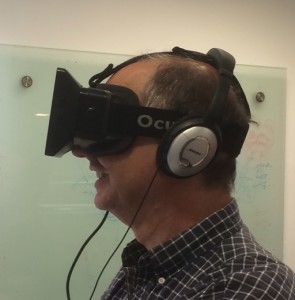November 26, 2014
Welcome to the open Net!
I wanted to play Tim Berners-Lee’s 1999 interview with Terry Gross on WHYY’s Fresh Air. Here’s how that experience went:
I find a link to it on a SlashDot discussion page.
The link goes to a text page that has links to Real Audio files encoded either for 28.8 or ISBN.
I download the ISBN version.
It’s a RAM (Real Audio) file that my Mac (Yosemite) cannot play.
I look for an updated version on the Fresh Air site. It has no way of searching, so I click through the archives to get to the Sept. 16, 1999 page.
It’s a 404 page-not-found page.
I search for a way to play an old RAM file.
The top hit takes me to Real Audio’s cloud service, which offers me 2 gigabytes of free storage. I decline.
I pause for ten silent seconds in amazement that the Real Audio company still exists. Plus it owns the domain “real.com.”
I download a copy of RealPlayerSP from CNET, thus probably also downloading a copy of MacKeeper. Thanks, CNET!
I open the Real Player converter and Apple tells me I don’t have permission because I didn’t buy it through Apple’s TSA clearance center. Thanks, Apple!
I do the control-click thang to open it anyway. It gives me a warning about unsupported file formats that I don’t understand.
Set System Preferences > Security so that I am allowed to open any software I want. Apple tells me I am degrading the security of my system by not giving Apple a cut of every software purchase. Thanks, Apple!
I drag in the RAM file. It has no visible effect.
I use the converter’s upload menu, but this converter produced by Real doesn’t recognize Real Audio files. Thanks, Real Audio!
I download and install the Real Audio Cloud app. When I open it, it immediately scours my disk looking for video files. I didn’t ask it to do that and I don’t know what it’s doing with that info. A quick check shows that it too can’t play a RAM file. I uninstall it as quickly as I can.
I download VLC, my favorite audio player. (It’s a new Mac and I’m still loading it with my preferred software.)
Apple lets me open it, but only after warning me that I shouldn’t trust it because it comes from [dum dum dum] The Internet. The scary scary Internet. Come to the warm, white plastic bosom of the App Store, it murmurs.
I drag the file in to VLC. It fails, but it does me the favor of tellling me why: It’s unable to connect to WHYY’s Real Audio server. Yup, this isn’t a media file, but a tiny file that sets up a connection between my computer and a server WHYY abandoned years ago. I should have remembered that that’s how Real worked. Actually, no, I shouldn’t have had to remember that. I’m just embarrassed that I did not. Also, I should have checked the size of the original Fresh Air file that I downloaded.
A search for “Time Berners-Lee Fresh Air 1999” immediately turns up an NPR page that says the audio is no longer available.
It’s no longer available because in 1999 Real Audio solved a problem for media companies: install a RA server and it’ll handle the messy details of sending audio to RA players across the Net. It seemed like a reasonable approach. But it was proprietary and so it failed, taking Fresh Air’s archives with it. Could and should have Fresh Air converted its files before it pulled the plug on the Real Audio server? Yeah, probably, but who knows what the contractual and technical situation was.
By not following the example set by Tim Berners-Lee — open protocols, open standards, open hearts — this bit of history has been lost. In this case, it was an interview about TBL’s invention, thus confirming that irony remains the strongest force in the universe.









